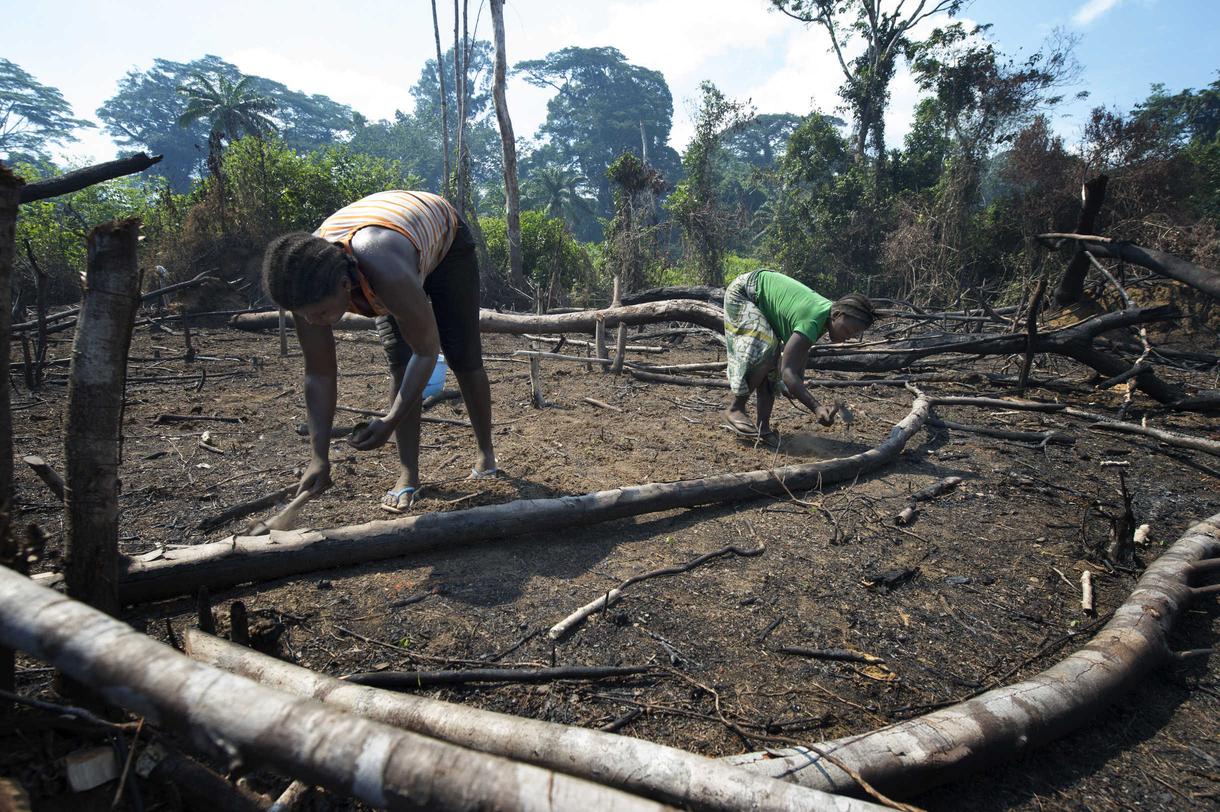Farmers in Liberia are concerned that expanding oil palm plantation will swallow up their forest lands.
Outside the southern Liberian town of Greenville, you can travel down a network of dirt roads and into the Liberia Forest Products company’s Butaw oil palm plantation. After turning off the main road you pass an open iron gate, with an uninhabited guard house. A few miles later there is another gate, this one manned by guards who with a bit of a wave will let you pass the vast nurseries of oil palms and the remnants of a large mill, roofless and rusted, stripped during Liberia’s civil war.
Just beyond is the community of Komonah, where the local farmers say the new unguarded gate is a bad omen: The oil palm plantation intends to expand from the borders of an established plantation, idle since the civil war, but now slowly coming back to life under the ownership of Liberia Forest Products, a subsidiary of the Equatorial Palm Oil company and Kuala Lumpur Kepong Bhd’s (KLK) joint venture in Liberia. Community members say the expanding plantation could swallow up forest land, including their community land.
One village elder, who did not want to share his name, says “at the [second, older] gate you saw, there is a cornerstone; we know that is the boundary. The company came and established a boundary line [three miles] farther out...” at the new gate.
Palm oil is used in food products and soap, and Liberia is hoping to export more of it to fund its post-war recovery. But the expansion of the Butaw plantation could have a negative effect on the small-scale farmers making a meager living in the area. And the destruction of forests for palm oil, in Liberia and many other tropical countries, produces greenhouse gases, widely considered to be a significant contributor to climate change. Oxfam issued a report on the ways that the world’s largest food companies are contributing to climate change and calls on them to work more actively to reduce emissions and use their influence on companies producing commodities like palm oil to minimize their negative effects on the environment.
Villages like Komonah are at risk as oil palm plantations expand. Eric Pyne, 31, a married father of five young sons, grows rice, cassava, corn, and other vegetables. To explain what is happening, he draws a square in the dirt, and then a larger one outside it, indicating the proposed expansion of the plantation will be widening its borders. “They say they are coming to carry out their survey,” he says, pointing to the larger, expanded area. “The first company that came here took our land and we never got any benefit from the company, and now the central government is letting them take our remaining land.”
“We don’t want this company to operate on our land,” Pyne says firmly. The area includes his small farm, his home, and the fields of many others in the village.
Forest land crucial for village

Farmers here say the forest is a crucial resource. “I can go in the bush, I can make my farm, and in the same forest I can set my traps and hunt,” Pyne says. Others say they gather wood for building houses and furniture, and fish in the rivers.
Pyne is now farming four or five acres of land he cleared over the previous dry season. He walks to it on a narrow path through dense forest, just off the main road. The common practice here is to cut down trees and vegetation, and burn small areas: His field still looks recently charred, with partly burned trees and logs lying about. But you can see small rice, cassava, and corn seedlings coming up out of the ashes. His wife and sister in law are planting more cassava seeds in one corner of the area, bent over and digging with hand tools in the ashy earth.
Pyne says if he is going to have to move away from his home, lose his farm and the forest, he would expect some level of compensation. But he says neither the company nor the government have indicated that the community will see any sort of development coming out of the plantation. “There will be no benefit to our children, Pyne says simply. “No drinking water, we don’t have latrines, we don’t have road connections, we don’t have school. We don’t have all that.”
Oxfam is asking consumers like you to encourage companies like Kellogg and General Mills to play a larger role in the debate around climate change, and push governments and their peers to do more to reduce greenhouse gas emissions. Part of this effort will involve ensuring that commitments to only buy palm oil that has not contributed to deforestation and displacement of communities like Komonah are implemented throughout their supply chains.
Anthony Tarpeh is a farmer in his late 50s who has lived in Komonah off and on his entire life. He and other elders have established a committee to monitor the proposed expansion of the plantation, and hope to negotiate some sort of agreement. “From the time God created the land, we are here from the creation,” he says. “We’re the first ones here. We have a right to these resources under customary law.”
Climate change could be the single biggest threat to winning the fight against hunger. Yet some food companies are actually making the problem worse. Use your power as a consumer and tell General Mills and Kellogg to help stop climate change from making people hungry.
